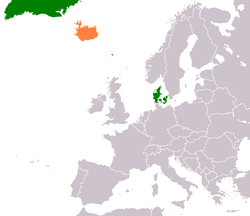Denmark–Iceland relations
Bilateral relations From Wikipedia, the free encyclopedia
Denmark–Iceland relations are the diplomatic relations between Denmark and Iceland. Both countries are full members of the Council of the Baltic Sea States, Nordic Council, NATO, and Council of Europe.
History
Summarize
Perspective
Because of the Kalmar Union, Iceland had been under the control of the Crown of Denmark since 1380,[1] although formally it had been a Norwegian possession until 1814.[2] In 1874, one thousand years after the first acknowledged settlement, Denmark granted Iceland home rule. The constitution, written the same year, was revised in 1903 and the extent of home rule increased in 1904.[3]
Denmark recognized the independence of Iceland on 1 December 1918 and the two countries remained in personal union until 1944 as part of the Danish–Icelandic Act of Union.[4] While in union with Denmark, the diplomatic relations of Iceland with the rest of the world were handled by Denmark.[5] Denmark opened their embassy in Reykjavík on 4 August 1919 with Johannes Erhardt Bøggild appointed as ambassador, while Iceland opened their embassy in Copenhagen on 16 August 1920 with Sveinn Björnsson as ambassador. The Icelandic embassy was temporarily closed from 1924 to 1926 due to financial costs.[6] King Christian X visited Iceland on 26 June 1921.[6]
Iceland became fully independent from Denmark on 17 June 1944 during the German occupation of Denmark, as diplomatic relations between the two countries were suspended.[5][7] King Christian X sent a message of congratulations to the Icelandic people.[8]
When Denmark with Norway turned to the proposed North Atlantic alliance after the Second World War, Icelandic leaders believed that they had to follow suit as a necessity for both Iceland and its two Nordic neighbors. During the debate, Stefánsson described the ties with Denmark and Norway as "family ties".[9]
All three countries became founding members of NATO in 1949.[9][10]
Return of Icelandic works
From September 1945 on, Iceland demanded the return of the sagas and codexes, which Árni Magnússon had collected and brought to University of Copenhagen.[11] Between 1971 and 1992, Denmark returned thousands of works to Iceland including the Codex Regius and Flateyjarbók.[12]
Resident diplomatic missions
- Denmark has an embassy in Reykjavík.[13]
- Iceland has an embassy in Copenhagen and consulates-general in Nuuk, Greenland and in Tórshavn, Faroe Islands.[14]
- Embassy of Denmark in Reykjavík
- Embassy of Iceland in Copenhagen
References
See also
Wikiwand - on
Seamless Wikipedia browsing. On steroids.



